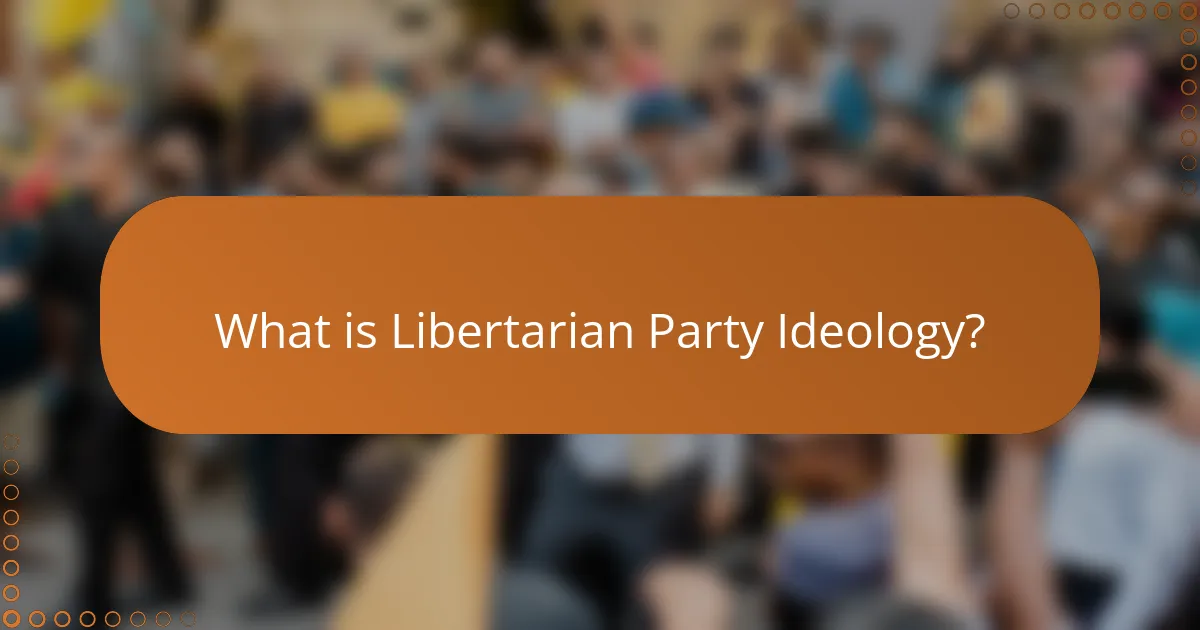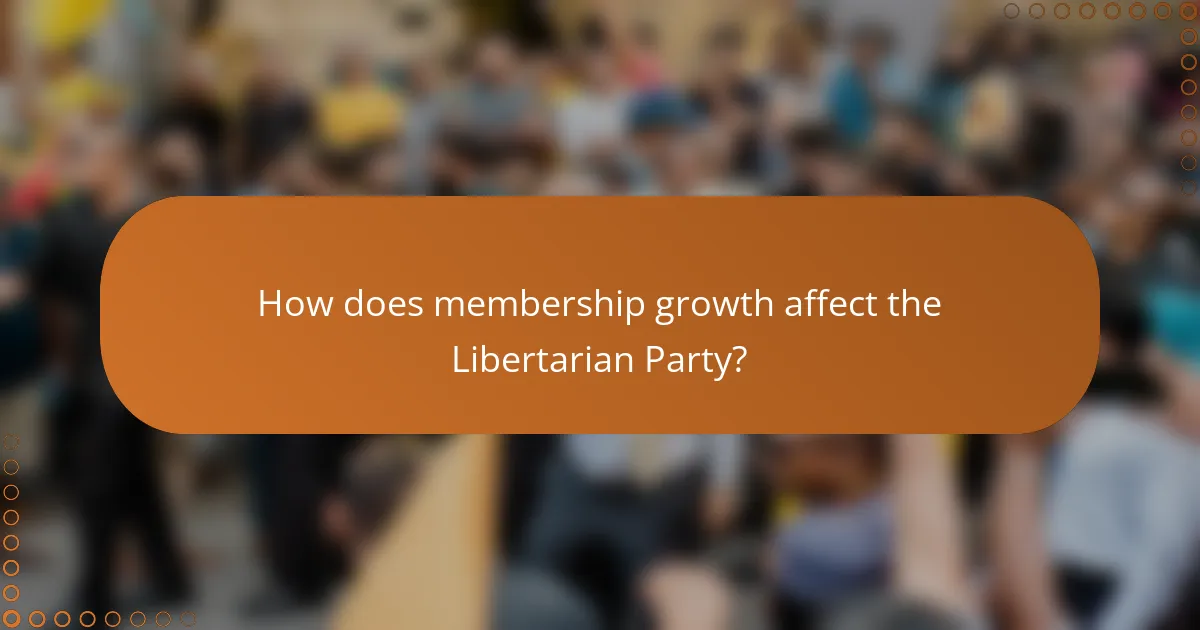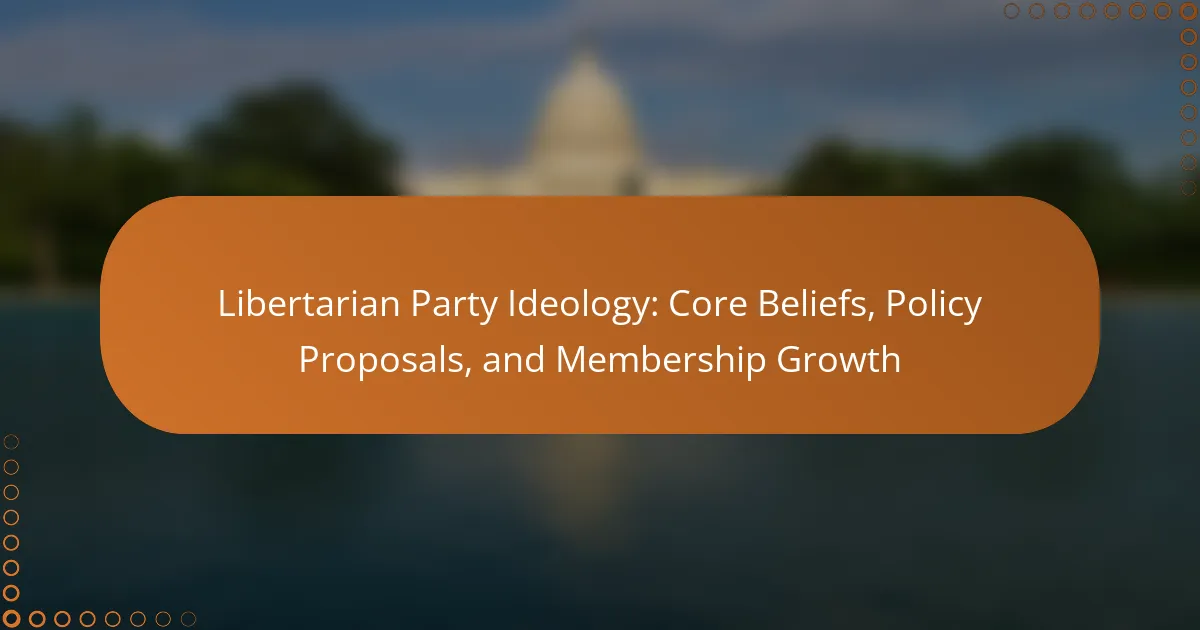The Libertarian Party is centered around the ideology of individual liberty, limited government, and free markets. It advocates for minimal state intervention in both personal and economic affairs, emphasizing that government should primarily protect individual rights, including life, liberty, and property. The article examines the core beliefs and policy proposals of the Libertarian Party, highlighting its opposition to taxation and regulation as violations of personal freedom. Additionally, it discusses the impact of membership growth on the party’s influence, resources, and electoral performance, alongside trends indicating increasing interest in libertarian principles, particularly among younger voters. The future trajectory of the Libertarian Party is explored, focusing on its potential to expand its reach and adapt to evolving political landscapes.

What is Libertarian Party Ideology?
Libertarian Party ideology emphasizes individual liberty, limited government, and free markets. It advocates for minimal state intervention in personal and economic matters. Libertarians believe that individuals should have the freedom to make their own choices. They argue that government should exist only to protect individual rights. This includes the rights to life, liberty, and property. The party opposes taxation and government regulation as infringements on personal freedom. Historically, the Libertarian Party was founded in 1971, reflecting these core beliefs. Its platform promotes civil liberties, non-interventionist foreign policy, and economic freedom.
How did Libertarian Party Ideology develop over time?
The Libertarian Party ideology developed from classical liberalism and individualist principles. Founded in 1971, it emphasized personal freedom and limited government intervention. Early influences included thinkers like John Locke and Friedrich Hayek. The party gained traction in the 1980s with candidates like Ron Paul. Over time, it expanded its platform to include non-interventionist foreign policy and civil liberties. The ideology also adapted to contemporary issues, such as drug legalization and privacy rights. Membership growth reflected increased public interest in libertarian principles. Today, the Libertarian Party continues to evolve, responding to changing political landscapes while maintaining core tenets of individual liberty.
What historical events influenced the formation of Libertarian beliefs?
The formation of Libertarian beliefs was influenced by several historical events. The Enlightenment era emphasized individual rights and limited government. This period fostered ideas of personal liberty and self-ownership. The American Revolution also played a crucial role. It highlighted the importance of freedom from oppressive rule. The Civil Rights Movement further shaped Libertarian thought. It advocated for individual rights and government non-interference. The fall of the Soviet Union in 1991 showcased the failure of collectivist ideologies. This event reinforced the appeal of free-market principles. Each of these events contributed to the development of Libertarian ideology.
Who are the key figures in the history of the Libertarian Party?
David Nolan is a key figure in the history of the Libertarian Party. He co-founded the party in 1971 and was instrumental in shaping its early platform. Ron Paul is another significant figure, serving as the party’s presidential nominee in 1988. He helped raise the party’s profile and attract new members. Gary Johnson, the party’s nominee in 2012 and 2016, expanded its visibility in national elections. Other notable figures include Murray Rothbard, whose writings influenced libertarian thought, and Harry Browne, the party’s candidate in 1996 and 2000, who promoted its principles effectively. Each of these individuals contributed to the party’s development and ideology.
What are the core beliefs of the Libertarian Party?
The core beliefs of the Libertarian Party center around individual liberty, limited government, and free markets. Libertarians advocate for minimal state intervention in personal and economic matters. They believe that individuals should have the freedom to make choices about their own lives, as long as those choices do not infringe on the rights of others. The party supports the idea that government should be limited to protecting individual rights, such as life, liberty, and property. Additionally, they oppose most forms of taxation and regulation, viewing them as infringements on personal freedom. The Libertarian Party also emphasizes non-interventionist foreign policy, advocating for peace and diplomacy over military action. These beliefs are rooted in the party’s commitment to maximizing personal autonomy and minimizing coercion by the state.
How does individual liberty define Libertarian ideology?
Individual liberty is the cornerstone of Libertarian ideology. Libertarians prioritize personal freedom and autonomy in all aspects of life. They believe that individuals should have the right to make choices without interference from the government. This includes decisions about personal property, lifestyle, and economic activities. The philosophy is rooted in the principle of self-ownership. Libertarians argue that each person owns their body and has the right to control it. Historical documents, such as the U.S. Constitution, reflect these values. The emphasis on individual rights distinguishes Libertarianism from other political ideologies.
What role does limited government play in Libertarian beliefs?
Limited government is central to Libertarian beliefs. Libertarians advocate for minimal state intervention in personal and economic matters. They believe that individual freedom is paramount. A limited government allows for personal autonomy and free markets. This ideology stems from the principle of self-ownership. Libertarians argue that government should only protect individual rights. They emphasize the importance of voluntary interactions and contracts. Historical context shows that extensive government often leads to oppression. Thus, limited government is seen as essential for a free society.
Why is free market capitalism essential to the Libertarian Party?
Free market capitalism is essential to the Libertarian Party because it aligns with the party’s core belief in individual liberty. This economic system promotes voluntary exchange and minimal government intervention. The Libertarian Party advocates for personal responsibility and economic freedom. Free market capitalism fosters innovation and competition, which benefits consumers. Historical evidence shows that countries with free markets experience higher economic growth. For example, the United States has thrived under capitalist principles since its founding. This economic model supports the Libertarian Party’s goal of maximizing individual choice. Thus, free market capitalism is foundational to their ideology and policy proposals.
What policy proposals does the Libertarian Party advocate?
The Libertarian Party advocates for limited government, individual liberties, and free markets. Their policy proposals include reducing the size and scope of government. They support eliminating most taxes and a reduction in government spending. The party also advocates for non-interventionist foreign policy and the end of military conscription. Libertarians promote the legalization of drugs and the decriminalization of victimless crimes. They emphasize personal responsibility and voluntary cooperation among individuals. Their proposals aim to maximize personal freedom while minimizing government interference.
Which economic policies are central to Libertarian proposals?
Libertarian proposals centralize on minimal government intervention in the economy. They advocate for free markets and voluntary exchanges. Taxation is viewed as coercive, leading to calls for significant tax reductions or abolition. Libertarians support deregulation to encourage competition and innovation. They promote privatization of government services to enhance efficiency. Monetary policy should focus on a stable currency, often favoring a return to the gold standard. Additionally, they oppose government subsidies and bailouts, arguing they distort market dynamics. These policies reflect a commitment to individual liberty and economic freedom.
How does the Libertarian Party approach social issues?
The Libertarian Party approaches social issues with a strong emphasis on individual liberty and personal responsibility. They advocate for minimal government intervention in personal choices. This includes support for issues like drug decriminalization, marriage equality, and freedom of expression. The party believes that individuals should have the right to make their own decisions without government interference. They argue that social issues are best handled at the individual level rather than through legislation. Their platform reflects a commitment to civil liberties and personal autonomy. This approach is rooted in the principle that a free society allows individuals to pursue their own happiness.
What foreign policy stance does the Libertarian Party take?
The Libertarian Party advocates for a non-interventionist foreign policy. This stance emphasizes minimal government involvement in international conflicts. The party opposes military interventions and foreign aid. It promotes free trade and diplomatic relations instead. The Libertarian Party believes in protecting individual liberties globally. They argue that non-interventionist policies prevent unnecessary wars. This approach is rooted in the belief that government should focus on domestic issues. The party’s platform often cites historical examples of costly military engagements.

How does membership growth affect the Libertarian Party?
Membership growth positively impacts the Libertarian Party by increasing its influence and resources. A larger membership base enhances fundraising capabilities. This financial support allows for more robust campaigning and outreach efforts. Increased membership can also lead to greater media attention and visibility. Moreover, a growing membership reflects broader public interest in libertarian principles. This can attract potential candidates for local, state, and national offices. Historical data shows that parties with higher membership often perform better in elections. For instance, the Libertarian Party saw increased visibility during the 2020 election due to a surge in membership.
What factors contribute to the growth of Libertarian Party membership?
Increased awareness of individual liberties contributes to the growth of Libertarian Party membership. Many individuals are drawn to the party’s emphasis on personal freedom and limited government. Economic factors, such as dissatisfaction with traditional political parties, also play a significant role. The party’s stance on fiscal responsibility attracts voters concerned about government spending. Social media and grassroots campaigns have enhanced outreach efforts. These platforms help disseminate Libertarian ideas to a broader audience. Additionally, the party’s clear stance on controversial issues resonates with younger voters. This demographic is increasingly seeking alternatives to mainstream political options.
How do outreach programs impact membership numbers?
Outreach programs significantly increase membership numbers for organizations. They engage potential members through targeted communication and community involvement. This approach raises awareness of the organization’s mission and values. For example, the Libertarian Party has reported growth after implementing outreach initiatives. In 2021, the party’s membership rose by 20% following a series of outreach events. These events included educational seminars and community service projects. Such activities create a positive perception and attract individuals who resonate with the party’s ideology. Overall, effective outreach leads to higher visibility and increased membership.
What role does social media play in attracting new members?
Social media plays a crucial role in attracting new members to the Libertarian Party. It provides a platform for outreach and engagement with potential supporters. Through targeted advertising, the party can reach specific demographics that align with its beliefs. Social media also facilitates the sharing of content that highlights core ideologies and policy proposals. This content can resonate with users who value personal freedom and limited government. Additionally, social media allows for real-time interaction, fostering a sense of community among existing and potential members. According to a Pew Research study, 69% of adults in the U.S. use social media, making it an essential tool for political outreach.
What challenges does the Libertarian Party face in expanding its membership?
The Libertarian Party faces several challenges in expanding its membership. One significant challenge is the perception of being a fringe party. Many potential members view the party as lacking mainstream appeal. This perception limits outreach and recruitment efforts. Additionally, the party struggles with internal divisions. Disagreements on policy and strategy can create a fragmented image. Another challenge is competition from larger parties. The Democratic and Republican parties dominate the political landscape, making it difficult for smaller parties to gain traction. Moreover, the party’s strict adherence to libertarian principles can alienate moderate voters. This can hinder efforts to broaden the base. Lastly, limited resources for marketing and outreach efforts pose a significant barrier to growth. These challenges collectively impact the party’s ability to attract and retain members.
How does public perception influence membership growth?
Public perception significantly influences membership growth in organizations like the Libertarian Party. Positive public perception can attract new members who align with the party’s values. A favorable image increases visibility and credibility, encouraging individuals to join. Conversely, negative perceptions can deter potential members and hinder growth. Research shows that organizations with strong public support often experience higher membership rates. For example, a 2021 study by the Pew Research Center found that political parties with favorable public opinions saw a 30% increase in membership inquiries. Thus, public perception plays a crucial role in shaping membership dynamics.
What internal conflicts might hinder the Libertarian Party’s expansion?
Internal conflicts that might hinder the Libertarian Party’s expansion include ideological divisions and factionalism. These divisions often arise from differing interpretations of core principles like individual liberty and limited government. Factionalism can lead to infighting, which distracts from cohesive messaging and outreach efforts. Additionally, disagreements over strategy, such as whether to pursue a more mainstream or radical approach, can create rifts within the party. Historical data shows that such conflicts have previously impeded electoral success, limiting the party’s ability to attract new members. Ultimately, these internal struggles can prevent the Libertarian Party from effectively promoting its platform and expanding its influence.

What is the future of the Libertarian Party Ideology?
The future of the Libertarian Party ideology appears to focus on individual liberty and limited government. This ideology may gain traction as more people seek alternatives to traditional political parties. The party emphasizes personal responsibility and free-market principles. Recent trends show increasing interest in libertarian ideas, especially among younger voters. Polls indicate a growing dissatisfaction with government overreach. Additionally, social issues align with libertarian beliefs, attracting diverse demographics. The party’s ability to adapt to current political climates will influence its future. Overall, the Libertarian Party ideology is positioned to expand its influence in the coming years.
How can the Libertarian Party adapt to changing political landscapes?
The Libertarian Party can adapt to changing political landscapes by embracing a flexible policy approach. This involves reassessing its core beliefs to resonate with contemporary issues. Engaging with grassroots movements can help the party stay relevant. The Libertarian Party should also focus on coalition-building with like-minded groups. Utilizing social media for outreach can enhance voter engagement. Furthermore, incorporating data-driven strategies can inform policy adjustments. Historical trends show that parties that evolve with public sentiment maintain their electoral viability. Adapting to demographic shifts is essential for sustained growth.
What strategies can the Libertarian Party use to engage younger voters?
The Libertarian Party can engage younger voters by leveraging social media platforms effectively. These platforms are widely used by younger demographics for communication and information. The party should create engaging content that resonates with their values, such as individual freedom and limited government. Hosting virtual town halls can facilitate direct interaction with young voters. Additionally, promoting policies that address issues important to this demographic, like student debt and criminal justice reform, can attract their interest. Collaborations with youth organizations can also amplify outreach efforts. According to a 2020 Pew Research study, 70% of young adults prefer to engage with political content online, underscoring the importance of digital strategies.
How might emerging issues shape the future of Libertarian beliefs?
Emerging issues may significantly influence the future of Libertarian beliefs. For instance, the rise of technology and privacy concerns could lead Libertarians to advocate more strongly for individual rights and data protection. Climate change could push the party to reconsider its stance on environmental regulations while maintaining a focus on market-based solutions. Social issues, such as criminal justice reform, may prompt Libertarians to adopt more progressive views to attract younger voters. Economic challenges, including inflation and government spending, could reinforce the party’s emphasis on fiscal responsibility and limited government. Overall, these evolving issues could reshape Libertarian beliefs to remain relevant in a changing political landscape.
What practical steps can individuals take to engage with Libertarian ideals?
Individuals can engage with Libertarian ideals by educating themselves on the philosophy and principles of libertarianism. Reading foundational texts, such as “The Libertarian Manifesto” by David Boaz, provides insight into core beliefs. Joining local Libertarian Party chapters fosters community engagement and activism. Participating in discussions and events helps spread awareness of libertarian values. Volunteering for campaigns supports candidates who align with libertarian principles. Advocating for policy changes that reflect individual freedom is crucial. Promoting free-market solutions in everyday conversations encourages broader acceptance. Supporting organizations that uphold civil liberties reinforces commitment to these ideals.
The main entity of this article is the Libertarian Party ideology, which is characterized by its core beliefs in individual liberty, limited government, and free markets. The article provides a comprehensive overview of the development of Libertarian beliefs, historical influences, and key figures in the party’s history. It outlines the party’s policy proposals, including taxation, regulation, and social issues, while also examining factors contributing to membership growth and challenges faced by the party. Additionally, the article discusses the future of Libertarian ideology in response to emerging issues and offers practical steps for individuals to engage with Libertarian principles.
